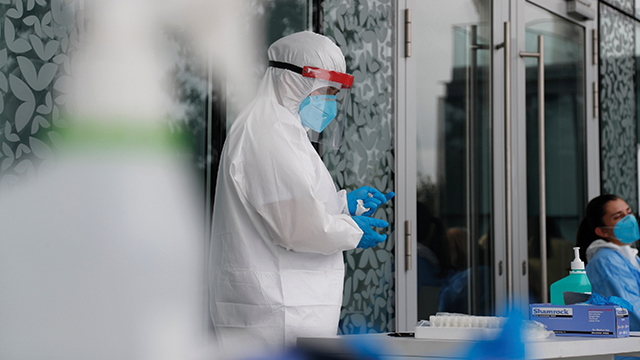In recent days, newly detected coronavirus cases in Georgia have continued to show a decreasing trend. However, the capital Tbilisi, given the highest number in terms of population, still reports the majority of cases on a daily basis. Tbilisi is followed by the Adjara, Imereti and Samegrelo-Zemo Svaneti regions.
Georgia reported 338 coronavirus cases, 1357 recoveries, and 17 deaths on Monday, with 9598 tests conducted over 24 hours. Georgian capital Tbilisi recorded the highest number of 208 cases, followed by the Adjara region with 50 cases, and the Samegrelo-Zemo Svaneti region with 33 cases.
On Tuesday, the country recorded 1354 coronavirus cases, 821 recoveries, and 15 deaths, with 30,456 tests conducted. Tbilisi recorded 669 cases, followed by the Imereti region with 184 cases, and the Samegrelo-Zemo Svaneti region with 129 cases.
Georgia reported 1015 coronavirus cases, 1151 recoveries, and 28 deaths on Wednesday, with 39,697 tests conducted across the country. Tbilisi recorded 550 cases, followed by the Samegrelo-Zemo Svaneti region with 102 cases, and the Imereti region with 84 cases.
The country reported 508 coronavirus cases, 1481 recoveries, and 17 deaths on Thursday, with 24,358 tests performed. Tbilisi again recorded the highest number of 252 COVID-19 cases within 24 hours, followed by the Adjara region with 61 cases and the Samegrelo-Zemo Svaneti region with 48 cases.
The total number of confirmed cases in Georgia since February 2020 has reached 340,838. Among these, 323,409 people recovered and 4699 died. There are 12,730 active cases of infection in the country.
The daily test-positivity rate this weekend stands at 2.09 %, down from 3.77% in the past 14 days.
There are 48 people in government-assigned quarantine facilities, 3965 COVID-19 patients hospitalized, while 668 asymptomatic and mild symptom patients are being treated at government-assigned treatment facilities.
Currently, out of 891 critical patients, 218 require mechanical ventilation.
The Vaccines
“As of May 27, a total of 125,601 vaccinations had been administered and 19,392 people are fully vaccinated,” reported the National Center for Disease Control and Public Health (NCDC).
On May 24, the Sinovac vaccination program started in Georgia. Registration for the Sinovac vaccination opened on May 21. Bookings filled quickly.
The Chinese-made Sinovac vaccine, like Sinopharm, is a traditional vaccine and is used for people over 18 years of age, reports the Ministry of Refugees, Labor, Health and Social Affairs. Paata Imnadze, Deputy Director of the NCDC, noted that the side effects of the Sinovac vaccine are minimal and mild.
Georgia is expected to receive the first batch of a total 1 million doses of Pfizer in June, first intended for those who need their second dose, followed by the most vulnerable groups.
The Restrictions
Considering the current epidemiological situation, the Georgian government has decided to lift two important restrictions this week: the country will open its land borders from June 1, and will once again allow eateries to host customers indoors on weekends.
“Land borders will be opened and it will be possible to cross the border with a full vaccination certificate and a negative PCR test result, or with only a negative result from a PCR test performed in the last 72 hours, provided such persons are again tested within 72 hours of entering Georgia,” said Giorgi Gibradze, Chief of the Operational Staff of the Interagency Coordination Council.
The government recommends that all visitors have health insurance, which also covers COVID cases.
In addition, Canada, Japan, Kuwait, China, South Korea, Moldova and Oman are to be added to the list of countries whose citizens and residents will be able to cross the Georgian border with a negative PCR result received in the last 72 hours.
By Ana Dumbadze














